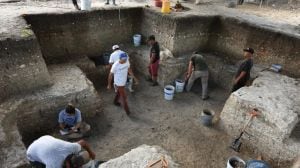Afghan House rejects Karzai nominees
Afghanistan's Parliament dealt a stinging rebuke to President Hamid Karzai on Saturday by rejecting 70 percent of his nominees for a new cabinet,including a regionally powerful warlord and the countrys only female minister....
Afghanistan’s Parliament dealt a stinging rebuke to President Hamid Karzai on Saturday by rejecting 70 percent of his nominees for a new cabinet,including a regionally powerful warlord and the countrys only female minister.
The laborious voting that took much of Saturday ended with the rejection of 17 of 24 nominees. The nominations,announced in mid-December,aimed to keep 12 current ministers in their posts for a second term. In part,that appeared aimed at satisfying US and Western desires to keep trusted hands in place.
Among those Karzai wanted to keep was Water and Power Minister Ismail Khan. But that raised many hackles because Khan was a warlord in Herat province during the civil war of the 1990s and retains considerable local power; critics said keeping Khan indicated the extent to which Karzai appears to be beholden to regional power-brokers at the expense of the whole countrys interests. Many of his new nominees were also criticised as having been picked for reasons other than their competency.
I think,unfortunately,that the criteria were either ethnicity or bribery or money, lawmaker Fawzia Kufi said before the voting.
The rejection of the womens affairs minister was an awkward blow to Karzai,who has pledged to place more women in high government posts in the traditionally male-dominated society.
Karzai has said he will make new nominations for the unfilled posts,but it is unclear when those names will be announced or a parliamentary vote held.
Karzai did not propose a nominee for foreign minister. He has asked incumbent Rangin Dadfar Spanta to stay in the post until after the Jan. 28 international conference in London that is to discuss the way forward for Afghanistan.
Meanwhile,the chief of Afghanistans elections commission said Saturday that a parliamentary vote will be held in May despite widespread international concern that the countrys electoral system needs serious reform.
Elections commission chief Ali Najafi told a news conference the national vote will be held May 22. However,he said Afghanistan needs about $50 million from the international community to meet the elections estimated budget of $120 million.






- 01
- 02
- 03
- 04
- 05

























